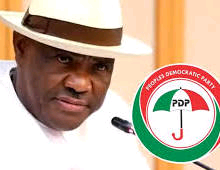Admin.
The Peoples Democratic Party (PDP) was thrown into one of its most dramatic moments in recent history on Saturday when delegates at the national elective convention in Ibadan, Oyo State, voted to expel three of its most controversial figures—Nyesom Wike, Minister of the Federal Capital Territory; former Ekiti State governor, Ayodele Fayose; and the party’s former National Secretary and ex-Imo governorship candidate, Samuel Anyanwu
The historic decision unfolded before thousands of party faithful who had filled the Liberty Stadium from as early as dawn. With party colours waving across the stands and supporters chanting the names of various aspirants, the atmosphere had been festive and hopeful—until events took a shocking turn.
The drama began when Chief Olabode George, respected party elder and former National Vice Chairman (South), unexpectedly stood up and moved a motion calling for the immediate expulsion of Wike, Fayose and Anyanwu. His words electrified the entire stadium. Delegates erupted—some cheering loudly in approval, others shouting in disbelief. The entire stadium buzzed with agitation as members tried to grasp the weight of what the elder statesman had just placed before the convention.
Within seconds, Samaila Buga, the outspoken PDP Chairman in Bauchi State, rose to second the motion. His endorsement gave the expulsion proposal immediate legitimacy, and the hall descended into a wave of uproar, discussions, and frantic consultations among party blocs. For several minutes, the convention floor was alive with chants, arguments, counter-arguments and spontaneous applause as the reality of the motion settled in.
Meanwhile, the convention itself had already been plagued by delays long before the moment of upheaval. Accreditation, which was scheduled to begin at 10am, moved at a sluggish pace. By 1:35pm, only 17 states and the Federal Capital Territory had successfully completed accreditation, leaving long queues of restless delegates outside the venue. Many complained that the slow process was a sign of deeper tensions and last-minute negotiations happening behind the scenes.
Inside the stadium, however, the energy remained intense. Thousands of delegates waved placards bearing the names and photographs of their preferred candidates. The party’s colours—green, white and red—were everywhere: on headscarves, T-shirts, umbrellas, banners and massive flags that fluttered proudly in the humid Ibadan air. Supporters sang solidarity songs, beating drums and blowing vuvuzelas as party officials tried to keep activities organized
But outside the venue, Ibadan city was paying a heavy price for hosting the high-stakes political gathering. Major roads across the metropolis were thrown into chaos as heavy vehicular congestion choked movement from one end of the city to the other. Areas such as Roundabout, Dugbe, Sango, University of Ibadan, Ojoo, Sasa, Oremeji, Oke Itunu and Agodi Gate were virtually shut down. Some commuters abandoned their journeys altogether, choosing to trek long distances rather than remain trapped in standstill traffic.
Commercial drivers complained bitterly, saying the sudden lockdown had cost them a full day’s work. “This kind of gridlock has not happened here in months. Everywhere is blocked because of this convention. We cannot move,” one frustrated taxi driver lamented.
To manage the massive crowds and potential flashpoints, security agencies deployed a formidable presence at the venue. Police officers, Civil Defence personnel, private security operatives and other security units created tight security rings around the stadium, frisking attendees, checking vehicles and closely monitoring all movement in and out of the facility. The screening was especially intensive at the four major entry points, where long lines of delegates frequently built up.
Inside the stadium, the tension grew more palpable as news of the expulsion motion spread. Delegates huddled in groups discussing the political implications, with many expressing shock at the boldness of the move. Nyesom Wike, who has been serving in an APC-led federal government despite being a PDP member, has long been the subject of internal disputes over alleged anti-party activities. Fayose has clashed repeatedly with the party leadership, while Anyanwu’s political battles within the Imo PDP structure are well known.
Many party insiders described the expulsion motion as a long-awaited reckoning that could reset the PDP’s internal power dynamics. Others feared it could ignite deeper divisions, especially in states where the expelled members still retain significant influence. Either way, the decision marked a major turning point for the party as it attempts to rebuild its strength and reposition itself ahead of future national elections.
Amidst the uproar, preparations for voting continued steadily. Voting cubicles erected at the centre of the pitch stood ready, waiting for the full complement of accredited delegates to arrive. Party officials moved between the stands and the pitch, coordinating logistics and calming visibly anxious supporters.
The unfolding events left many predicting that the 2025 PDP national convention would go down as one of the most consequential gatherings in the party’s nearly three-decade history. What was expected to be a colourful and celebratory convention quickly transformed into a landmark political moment that will shape party strategies, alliances and leadership contests in the months—and possibly years—to come.



